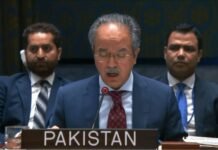Geneva, 11 October 2023 (TDI): The UN General Assembly has recently conducted elections to appoint 15 new members to the Human Rights Council, with Peru and Russia failing to secure a seat.
The newly elected members, including Albania, Brazil, Bulgaria, Burundi, China, Côte d’Ivoire, Cuba, Dominican Republic, France, Ghana, Indonesia, Japan, Kuwait, Malawi, and the Netherlands, will commence their three-year term on January 1, 2024.
This election marked the re-election of China, Côte d’Ivoire, Cuba, France, and Malawi for their second terms.
Established in 2006, the Human Rights Council comprises 47 member states selected through a secret ballot by the majority of General Assembly members, with a mandate to promote and protect fundamental freedoms globally.
During the latest UN General Assembly session, several significant decisions were made regarding the Human Rights Council, notably thwarting Russia’s attempt to regain its seat.
Also Read: UN Human Rights Chief denounces rising religious hatred
Russia, which had been previously suspended from the Council, failed to secure a return for the 2024-2026 term, receiving only 83 votes, considerably fewer than its competitors Albania and Bulgaria.
This decision was influenced by allegations against Russia related to its actions in Ukraine and domestic restrictions on civil liberties and civil society, aligning with General Assembly resolution 60/251.
Cuba, a consistent ally of Russia, managed to secure re-election in a competitive race for one of three seats designated for Latin America and the Caribbean.
Despite concerns about its domestic human rights record, Cuba received 146 votes, surpassing other contenders.
In Asia and Africa, China and Burundi were elected in uncontested races, although critics have raised concerns about their suitability for council membership.
The absence of competitive races and the selection of countries with questionable human rights records have prompted calls for states to run for council seats in line with resolution 60/251, addressing the issue of close-slate elections that limit opportunities for positive outcomes.
The International Service for Human Rights (ISHR) has actively campaigned for states to vote in accordance with resolution 60/251 and has assessed the records of all 17 candidates in this year’s elections.
These developments reflect the international community’s commitment to preserving the Human Rights Council’s integrity and credibility by scrutinizing potential members based on their human rights records and commitments.
To ensure equitable geographical distribution, seats are allocated among regional groups. Council members, who serve for three years, cannot be immediately re-elected after two consecutive terms.
Membership on the Council carries the responsibility to uphold high human rights standards, as emphasized by the states themselves.
Iffat Masood is Contributor and Content writer on THE DIPLOMATIC INSIGHT, and also Ambassador from IAMCR. She is perusing her PhD. from UAB Barcelona, Spain in Audio-Video Communications and Advertising.








